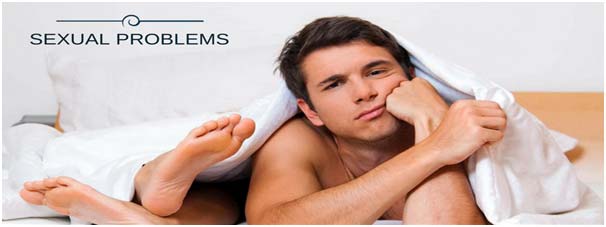Sexual Problems in Men
A sexual problem, or sexual dysfunction, refers to a problem during any phase of the sexual response cycle that prevents the man or couple from experiencing satisfaction from the activity. The sexual response cycle has four phases: excitement, plateau, orgasm, and resolution.
While research suggests that sexual dysfunction is common (43% of women and 31% of men report some degree of difficulty), it is a topic that many people are hesitant to discuss. Fortunately, most cases of sexual dysfunction are treatable, so it is important to share your concerns with your partner and doctor.
Sexual problems belong to the group of conditions known as psychosomatic disorders, in which the body expresses the distress via a symptom, such as low libido. Symptoms can be the result of physical (somatic) and/or psychological/relationship factors.
All psychosexual problems can be "primary", meaning that the problem has been there since the start of sexual experience, or "secondary", when there was a period of normal functioning before the problem began.
The most common male sexual problems are:- premature ejaculation
- Erectile dysfunction.
- Peyronie's disease
- low libido
- Ejaculation problems including retrograde, delayed and painful ejaculation.

What is sexual dysfunction in males?
Sexual dysfunction is any physical or psychological problem that prevents you or your partner from getting sexual satisfaction. Male sexual dysfunction is a common health problem affecting men of all ages, but is more common with increasing age. Treatment can often help men suffering from sexual dysfunction.
The main types of male sexual dysfunction are:
- Erectile dysfunction (difficulty getting/keeping an erection)
- Premature ejaculation (reaching orgasm too quickly)
- Delayed or inhibited ejaculation (reaching orgasm too slowly or not at all)
- Low libido (reduced interest in sex)
What causes sexual dysfunction in males?
Physical causes of overall sexual dysfunction may be:- Low testosterone levels
- Prescription drugs (antidepressants, high blood pressure medicine)
- Blood vessel disorders such as atherosclerosis (hardening of the arteries) and high blood pressure
- Stroke or nerve damage from diabetes or surgery
- Smoking
- Alcoholism and drug abuse
Psychological causes might include:
- Concern about sexual performance
- Marital or relationship problems
- Depression, feelings of guilt
- Effects of past sexual trauma
- Work-related stress and anxiety

What Are Ejaculation Disorders?
There are different types of ejaculation disorders in men, including:- Premature ejaculation: This refers to ejaculation that occurs before or soon after penetration.
- Inhibited or retarded ejaculation: This is when ejaculation is slow to occur.
- Retrograde ejaculation: This occurs when, at orgasm, the ejaculate is forced back into the bladder rather than through the urethra and out the end of the penis.

How does sexual dysfunction affect men?
The most common problems men face with sexual dysfunction are troubles with ejaculation, getting and keeping an erection, and reduced sexual desire. Ejaculation disorders
Problems with ejaculation are:
- Premature ejaculation (PE) - ejaculation that occurs before or too soon after penetration
- Inhibited or delayed ejaculation - ejaculation does not happen or takes a very long time
- Retrograde ejaculation - at orgasm, the ejaculate is forced back into the bladder rather than through the end of the penis
The exact cause of premature ejaculation (PE) is not known. While in many cases PE is due to performance anxiety during sex, other factors may be:
- Stress
- Temporary depression
- History of sexual repression
- Low self-confidence
- Lack of communication or unresolved conflict with partner
Studies suggest that the breakdown of serotonin (a natural chemical that affects mood) may play a role in PE. Certain drugs, including some antidepressants, may affect ejaculation, as can nerve damage to the back or spinal cord.
Physical causes for inhibited or delayed ejaculation may include chronic (long-term) health problems, medication side effects, alcohol abuse, or surgeries. The problem can also be caused by psychological factors such as depression, anxiety, stress, or relationship problems.
Retrograde ejaculation is most common in males with diabetes who suffer from diabetic nerve damage. Problems with the nerves in the bladder and the bladder neck force the ejaculate to flow backward. In other men, retrograde ejaculation may be a side effect of some medications, or happen after an operation on the bladder neck or prostate.
Erectile dysfunction (ED)
Erectile dysfunction (ED) is the inability to get and keep an erection for sexual intercourse. ED is quite common, with studies showing that about one half of American men over age 40 are affected. Causes of ED include:
- Diseases affecting blood flow such as hardening of the arteries
- Nerve disorders
- Stress, relationship conflicts, depression, and performance anxiety
- Injury to the penis
- Chronic illness such as diabetes and high blood pressure
- Unhealthy habits like smoking, drinking too much alcohol, overeating, and lack of exercise
Low libido (reduced sexual desire)
Low libido means your desire or interest in sex has decreased. The condition is often linked with low levels of the male hormone testosterone. Testosterone maintains sex drive, sperm production, muscle, hair, and bone. Low testosterone can affect your body and mood. Reduced sexual desire may also be caused by depression, anxiety, or relationship difficulties. Diabetes, high blood pressure, and certain medications like antidepressants may also contribute to a low libido.
ARTICLE BY DR. (HAKIM) ASLAM JAVED ON SEXUAL PROBLEM:-
https://www.unaniherbal.org/sexual-problems-solutions.html
Nomination form for 2017 Global Awards :
https://www.unaniherbal.org/nomination-form.html
For more information you can also follow us on:

 If you wish to cancel your subscription to this newsletter click here
© Copyright 2014 Unani Herbal
If you wish to cancel your subscription to this newsletter click here
© Copyright 2014 Unani Herbal

